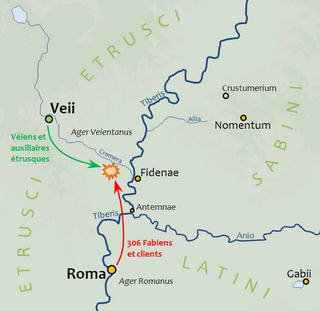Related Research Articles

The gens Fabia was one of the most ancient patrician families at ancient Rome. The gens played a prominent part in history soon after the establishment of the Republic, and three brothers were invested with seven successive consulships, from 485 to 479 BC, thereby cementing the high repute of the family. Overall, the Fabii received 45 consulships during the Republic. The house derived its greatest lustre from the patriotic courage and tragic fate of the 306 Fabii in the Battle of the Cremera, 477 BC. But the Fabii were not distinguished as warriors alone; several members of the gens were also important in the history of Roman literature and the arts.
Agrarian laws were laws among the Romans regulating the division of the public lands, or ager publicus. In its broader definition, it can also refer to the agricultural laws relating to peasants and husbandmen, or to the general farming class of people of any society.

Agrippa Menenius Lanatus was a consul of the Roman Republic in 503 BC, with Publius Postumius Tubertus. He was victorious over the Sabines and was awarded a triumph which he celebrated on 4 April, 503 BC. According to Livy, he also led Roman troops against the Latin town of Pometia. In some traditions he and his colleague also completed a census during their consulship.

Lucius Minucius Esquilinus Augurinus was a Roman politician in the 5th century BC, consul in 458 BC, and decemvir in 450 BC.
Appius Claudius Sabinus Regillensis or Inregillensis was the legendary founder of the Roman gens Claudia, and consul in 495 BC. He was the leading figure of the aristocratic party in the early Roman Republic.

The Battle of the Cremera was fought between the Roman Republic and the Etruscan city of Veii, in 477 BC.
Publius Postumius Tubertus, the son of Quintus, was the first of the patrician gens Postumia to obtain the consulship, which he held in 505 BC, and again in 503. Ten years later, he was one of the envoys sent by the Roman Senate to negotiate with the plebeians during the first secessio plebis. The outcome of those negotiations reunited the Roman people, and established the tribunes of the plebs, one of the most important institutions of the Roman Republic.
The gens Menenia was a very ancient and illustrious patrician house at ancient Rome from the earliest days of the Roman Republic to the first half of the fourth century BC. The first of the family to obtain the consulship was Agrippa Menenius Lanatus in 503 BC. The gens eventually drifted into obscurity, although its members were still living in the first century BC.
The gens Verginia or Virginia was a prominent family at ancient Rome, which from an early period was divided into patrician and plebeian branches. The gens was of great antiquity, and frequently filled the highest honors of the state during the early years of the Republic. The first of the family who obtained the consulship was Opiter Verginius Tricostus in 502 BC, the seventh year of the Republic. The plebeian members of the family were also numbered amongst the early tribunes of the people.
Caeso Fabius Vibulanus was consul of the Roman republic in 484, 481, and 479 BC. He had earlier held the office of quaestor parricidii in 485 BC in connection with the trial and execution of Spurius Cassius Vecellinus.
Titus Cloelius Siculus was a Roman statesman of the early Republic, and one of the first consular tribunes in 444 BC. He was compelled to abdicate after a fault was found during his election. Two years later he was one of the founders of the colony of Ardea.

The gens Considia was a plebeian family at ancient Rome. The Considii came to prominence in the last century of the Republic, and under the early Empire, but none of them rose any higher than the praetorship.

The lex Publilia, also known as the Publilian Rogation, was a law traditionally passed in 471 BC, transferring the election of the tribunes of the plebs to the comitia tributa, thereby freeing their election from the direct influence of the Senate and patrician magistrates.
Vopiscus Julius Iullus was a Roman statesman, who held the consulship in 473 BC, a year in which the authority of the Roman magistrates was threatened after the murder of a tribune of the plebs.
The gens Genucia was a prominent family of the Roman Republic. It was probably of patrician origin, but most of the Genucii appearing in history were plebeian. The first of the Genucii to hold the consulship was Titus Genucius Augurinus in 451 BC.
The gens Maenia, occasionally written Mainia, was a plebeian family at ancient Rome. Members of this gens are first mentioned soon after the establishment of the Republic, and occur in history down to the second century BC. Several of them held the position of tribune of the plebs, from which they strenuously advocated on behalf of their order. The most illustrious of the family was Gaius Maenius, consul in 338 BC, and dictator in both 320 and 314. In some manuscripts, the nomen Maenius appears to have been erroneously substituted for Menenius or Manlius; there are also instances of confusion with Manilius, Maelius, and Maevius.
Gaius Horatius Pulvillus was a Roman politician during the 5th century BC, and was consul in 477 and 457 BC.
Spurius Servilius Structus was a Roman consul in 476 BC.
Agrippa Menenius Lanatus was consul of the Roman Republic in 439 BC and possibly the consular tribune of 419 and 417 BC.
Publius Lucretius Tricipitinus was a consular tribune of the Roman Republic in 419 and 417 BC.
References
- 1 2 3 Livy, ii. 52.
- ↑ Per the Varronian chronology. Dionysius of Halicarnassus dates their consulship to "the seventy-sixth Olympiad (the one at which Scamander of Mitylene won the foot-race), when Phaedo was archon at Athens" or 475 BC. (Roman Antiquities, ix. 18.)
- ↑ Livy, ii. 50, 51.
- ↑ Livy, Ab Urbe Condita , ii. 51.
- ↑ Dionysius of Halicarnassus, Roman Antiquities, ix. 23, 24.
- ↑ Cassius Dio, Roman History, v. 21.